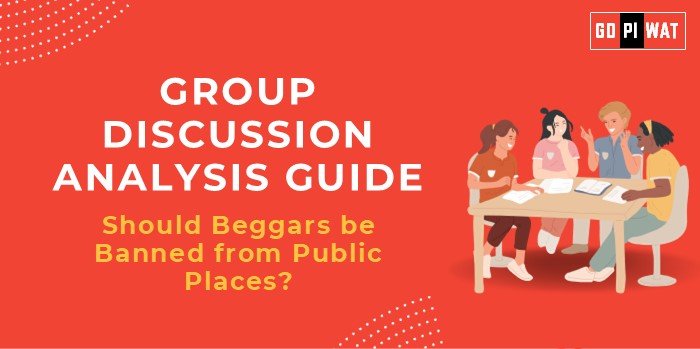📋 Should Beggars be Banned from Public Places?
🌐 Introduction to the Topic
- 📖 Opening Context: The visibility of beggars in public places raises important questions about social welfare, poverty, and public order. For B-school candidates, this topic involves understanding socio-economic challenges and ethical perspectives.
- 📜 Topic Background: Begging is a centuries-old phenomenon, often associated with poverty, homelessness, and lack of social support. With urbanization and economic inequality, the number of beggars has increased, especially in large cities. Various countries have explored policies to regulate or ban begging, yet the issue remains complex due to human rights considerations.
📊 Quick Facts and Key Statistics
- 🌍 Global Poverty Rate: Over 700 million people live below the poverty line globally, creating a challenging environment that can drive individuals to beg.
- 🇮🇳 India’s Poverty: Approximately 22% of India’s population lives below the national poverty line, highlighting economic struggles.
- 🏚️ Homeless Population: Around 1.77 million people in India are homeless, many of whom resort to begging for survival.
- ⚖️ Begging Prohibition Laws: More than 20 Indian states have laws against begging, yet enforcement varies widely.
🤝 Stakeholders and Their Roles
- 🏛️ Government: Enforces laws, provides social welfare programs, and designs rehabilitation schemes.
- 🌍 Non-Governmental Organizations (NGOs): Offer support and rehabilitation programs to aid beggars.
- 🧑🤝🧑 Citizens: Engage directly with beggars and influence public perceptions; their charitable actions can support or discourage begging.
- 🏙️ Municipal Corporations: Responsible for managing public spaces and maintaining order, they often address the visibility of beggars in urban areas.
🏆 Achievements and Challenges
✨ Achievements
- 📈 Social Welfare Initiatives: Schemes like the PMAY and PMGKY aim to reduce poverty and provide basic amenities.
- 🏘️ Rehabilitation Programs: Certain states have launched rehabilitation shelters offering vocational training for beggars.
⚠️ Challenges
- 📉 Persistent Poverty and Unemployment: High poverty rates and lack of job opportunities continue to drive begging.
- ⚖️ Human Rights Concerns: A ban may infringe on the rights of the impoverished to seek help or survive.
🌍 Global Comparisons
- 🇳🇴 Norway: Some cities impose strict restrictions on begging, while also providing comprehensive social welfare.
- 🇺🇸 United States: Mixed policies, with some cities implementing “no-begging zones.”
📖 Case Studies
- 📍 Delhi’s Anti-Begging Act: Limited success due to challenges in enforcement and lack of adequate social support systems.
💬 Structured Arguments for Discussion
- 👍 Supporting Stance: “Banning beggars from public places can improve public order, reduce criminal activities linked to organized begging, and promote tourism.”
- 👎 Opposing Stance: “Banning begging without offering alternative support violates basic human rights and ignores the underlying issue of poverty.”
- ⚖️ Balanced Perspective: “While banning beggars may help keep public spaces orderly, a sustainable solution must address poverty and offer rehabilitation programs.”
🧠 Effective Discussion Approaches
- 📊 Impactful Statistic: “With over 1.77 million homeless individuals in India, addressing the underlying causes of begging is crucial to social welfare.”
- 🌍 Contrast Approach: “While some argue that beggars negatively impact public spaces, others view them as individuals in need who reflect larger societal issues.”
- 💡 Counter-Argument Handling: “Though a ban might address immediate public concerns, without rehabilitative efforts, it may exacerbate social inequality.”
📊 Strategic Analysis of Strengths and Weaknesses
- 💪 Strengths: Improved public order, possible reduction in organized begging, enhanced tourism experience.
- 🤔 Weaknesses: Ethical concerns, risk of criminalizing poverty, insufficient support infrastructure.
- 🚀 Opportunities: Community-based rehabilitation, partnerships with NGOs, government-funded social welfare programs.
- ⚠️ Threats: Increased crime if beggars are displaced without support, violation of human rights, social backlash.
📚 Connecting with B-School Applications
Insights from this topic can inform projects in social policy, urban planning, and ethical governance. B-school students can develop critical thinking skills applicable to policy analysis and corporate social responsibility projects.
- ❓ Sample Interview Questions:
- “How would you balance public order and human rights if tasked with formulating a policy on begging?”
- “What social interventions do you think are effective for reducing begging?”
- 💡 Insights for B-School Students: This topic underscores the importance of social responsibility in business, the ethics of public policy, and the need for sustainable solutions to poverty-related issues.


